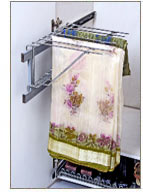How to Care for Sarees?
 Sarees
are indeed a prized possession for any Indian woman. All women look great in
Indian sarees! However, some of these sarees,
like kanjeevaram sarees
or banarasi sarees, are
very expensive. If proper care of these sarees is not taken then they do not
last for very long. Here are some tips for taking care of your expensive
sarees.
Sarees
are indeed a prized possession for any Indian woman. All women look great in
Indian sarees! However, some of these sarees,
like kanjeevaram sarees
or banarasi sarees, are
very expensive. If proper care of these sarees is not taken then they do not
last for very long. Here are some tips for taking care of your expensive
sarees.
- Always keep the washed and unwashed sarees separately. Never keep 'once worn' saree back in your wardrobe. If you wish to wear the saree once again, maintain a separate place, for example a drawer or a chest, for keeping them. Remember to place moth repellents in such places.
- Silk sarees are very delicate. Do not wash them. Dry cleaning is best for these valuable sarees.
- It is all right to hang your
casual/regular
wear sarees in the cuboard but heavy sarees like
zari sarees with siver
and gold embroidery or other such work should not be hanged in the
cupboard. Keep them in folded position after wrapping them in some soft
cloth or dupatta like those made of mulmul etc.

- Avoid washing sarees in machines. Hand washing is best for traditional Indian sarees.
- saree care If you starch your cotton sarees, always ensure that no starch remains are left on the saree. It may attract moths leading to destruction of not only these sarees but other sarees also that are placed with them.
- Always keep moth repellent like naphthalene balls in the cupboard where you place your banarasi or other silk sarees.
- As far as possible, use saree covers to keep your sarees. Don't overload these saree cover boxes. Most of the saree covers can hold six to eight sarees but if you place heavy and voluminous sarees, they may hold fewer sarees than that.
- If shopping sarees with heavy embroidery work on pallu, ensure that you get stitched a net lining (below pallu) so that the threads of your embroidered sarees do not come off.
- Expensive chiffon sarees or Georgette sarees should not be washed. They shrink when they come in contact of water. Prefer dry cleaning them. Whenever you buy any saree of some fabric about which you do not know, ask the shopkeeper about its maintenance- whether it is washable or not? If yes, whether it can be machine washed or needs hand washing? And other questions like this.
- Never keep soaked the sarees like batik, bandhani sarees or other sarees that are dyed separately for giving designs. They may loose their color. Handwash them with mild detergent soaps.
If you follow the above sari care instructions along with saree manufacturer's instructions, you can wear your sarees for long and even pass it to your next generation!